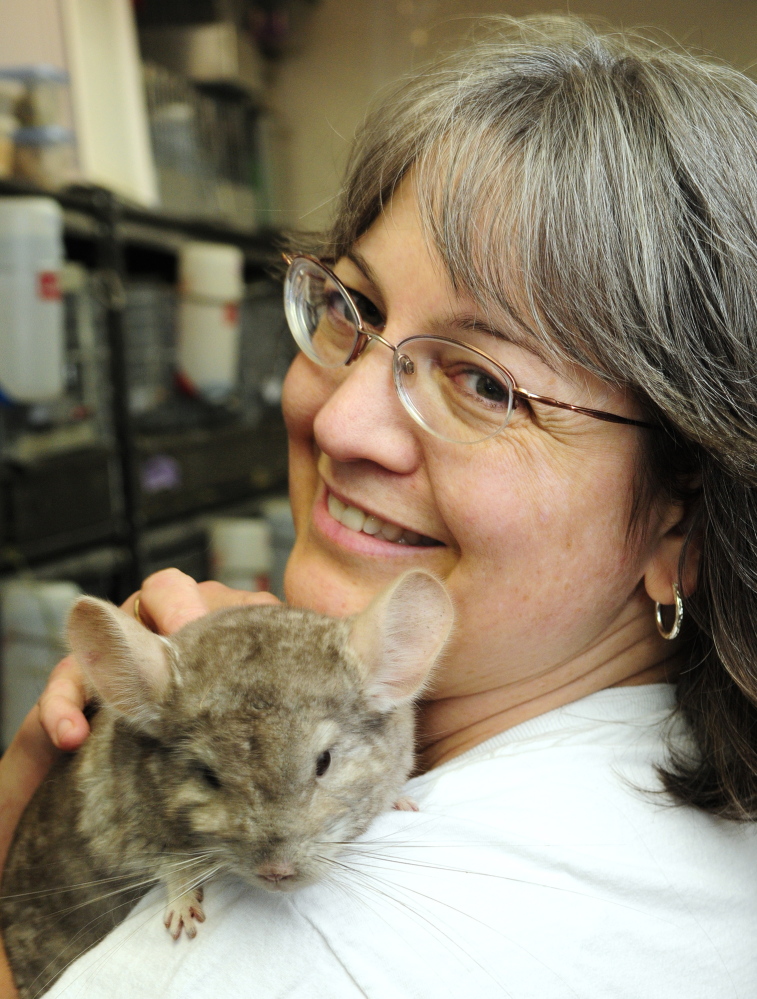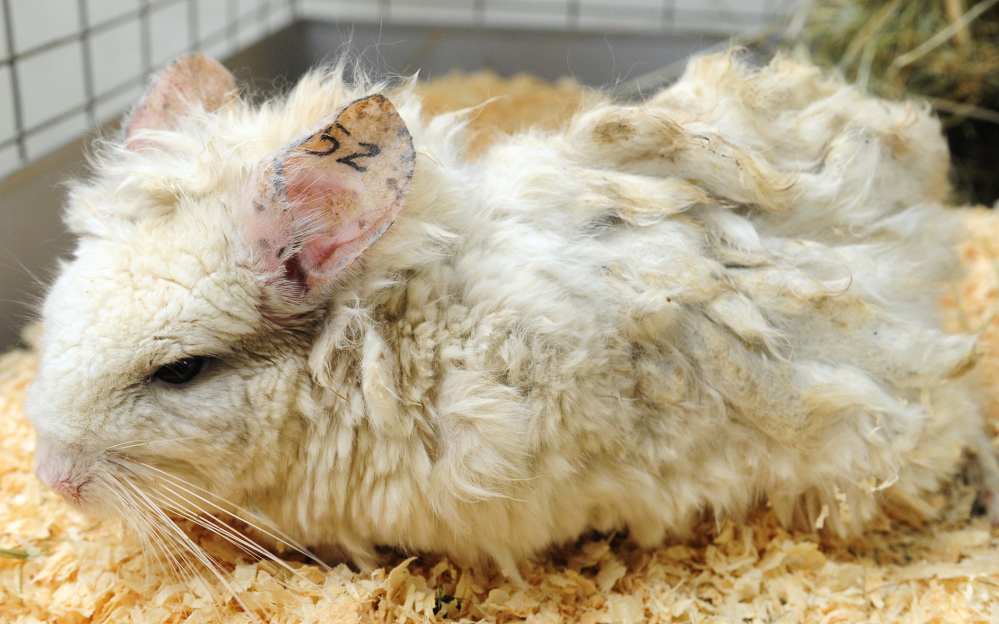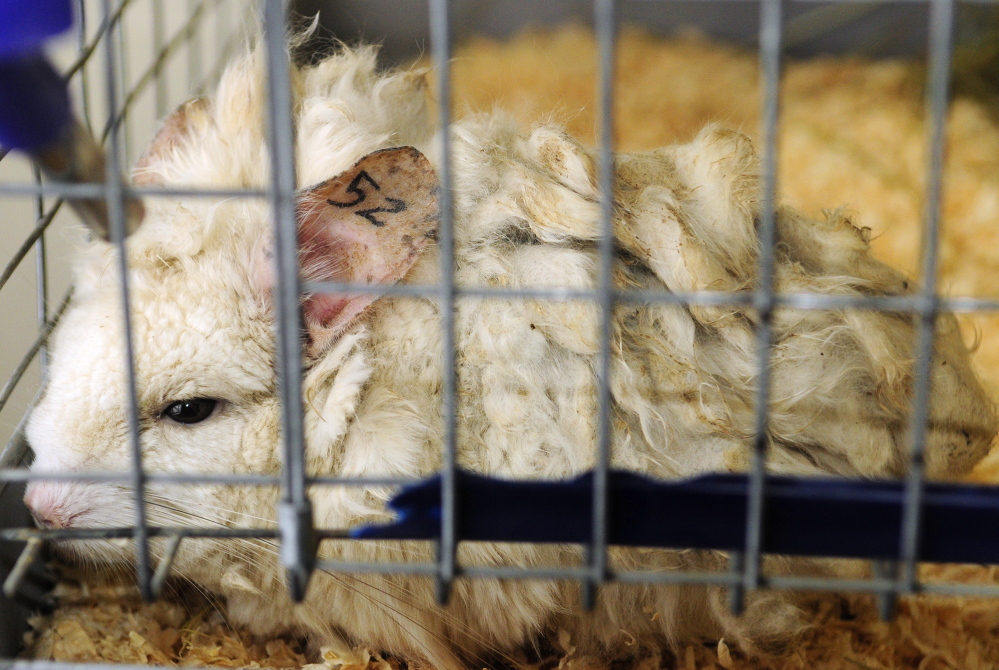AUGUSTA — Missing a foot, his fur matted and filthy, the severely underweight Matty, also known as chinchilla number 52, sits in his cage, barely summoning the energy to do much more than sit in place in his fresh wood shavings.
Across from him and the eight other underfed chinchillas purchased from a Pennsylvania breeder’s dirty, barely heated shed sit 30 versions of what well-cared for, carefully-groomed and well-fed chinchillas look like, in Marianne Sansouci’s chinchilla “barn” — a former storage room now lined with metal cages for the chinchillas she breeds in her Augusta home.
Sansouci, working with two other chinchilla experts, helped remove nearly 60 chinchillas from what she called a backyard breeder, though five of the animals have since died because of various health problems.
She picked up 15 of the neglected small animals in Pennsylvania during a recent four-day mission to retrieve chinchillas and give them a chance of a better home. She dropped six of them off at new homes on the way back to Maine, and she is nursing Matty and his mates back to health so they can be adopted as pets once they’ve gone through a quarantine period, been cleaned up and gained some weight.
“All of these guys are going to be great pets,” Sansouci, a breeder and licensed chinchilla shelter operator, said of the nine remaining rescued creatures at her home. “I haven’t had any of them bite me. They’re all very trusting, which is amazing, given the neglect they’ve been through.”
Other rescued chinchillas, which are soft-furred, roughly 1-pound animals, have ragged ears that are missing chunks of skin because of frostbite in the Pennsylvania breeder’s poorly insulated shed, which Sansouci said was heated by only two space-heaters. All were underfed and dirty. She said they hadn’t been properly cared for, nor had their cages been cleaned out for at least five months.
The rescued animals also don’t know how to “dust,” which is how chinchillas clean themselves. Because the animals’ fur would become matted and mildewed if they bathed in water, like most other animals, they instead clean themselves by rolling around in dust.
Pet chinchillas, Sansouci said, should have special pumice dust to roll in to stay clean. When she puts some of the dust into a cage of one of her own chinchillas, the animal promptly rolls around in it. When she puts the dust into the Pennsylvania chinchillas’ cages, they mostly just sit there, not knowing what to do.
“These guys haven’t been dusted,” she said. “They’ve never seen a dust bath. That’s so sad.”
Sansouci got involved in the rescue effort after learning about it from a Pennsylvania woman and fellow chinchilla breeder who posted a message online about her efforts to obtain and care for the animals. So Sansouci went to help, as the other woman paid the Pennsylvania breeder $500 for his 60-chinchilla herd, because he had cancer and no longer was able to care for them. The man’s son was left to look after them, Sansouci said, but the animals were neglected and not fed adequately.
Sansouci said she took all males, which will need 30 days in quarantine to make sure they don’t have diseases that could spread and to get back to good health. She is confident she will not have a problem finding new homes for them. She said she screens applicants who wish to adopt chinchillas. An application is required.
She said the animals haven’t been handled by people much, but they seem to be responding well to their newfound attention. They’re eating a steady diet of mostly hay. Each animal has its own cage, complete with a water bottle and a block of wood to chew on to keep its teeth, which grow constantly, in good condition.
Sansouci said the man from whom the chinchillas were rescued kept the animals in filthy conditions, but he had a much nicer clean room where he kept baby chinchillas, or kits, which were for sale.
She urged anyone buying a chinchilla — or any animal, for that matter — to ask to see where the animals were raised, to examine their living conditions.
Sansouci breeds and shows her own chinchillas through her business, Sydchilla Chinchillas. She said her animals are prized for and judged in shows by the quality of their super-soft fur.
While she has only males, others have females from the group, which they believe to be pregnant. So they’ll need help with the expense of caring for the animals, especially if there is a population explosion because of multiple births.
Chinchillas can live to 15 years, should be kept somewhere that is below 70 degrees year-round, and like to sleep during the day, being most active at dusk and dawn.
Keith Edwards — 621-5647 kedwards@centralmaine.com
Send questions/comments to the editors.






Success. Please wait for the page to reload. If the page does not reload within 5 seconds, please refresh the page.
Enter your email and password to access comments.
Hi, to comment on stories you must . This profile is in addition to your subscription and website login.
Already have a commenting profile? .
Invalid username/password.
Please check your email to confirm and complete your registration.
Only subscribers are eligible to post comments. Please subscribe or login first for digital access. Here’s why.
Use the form below to reset your password. When you've submitted your account email, we will send an email with a reset code.